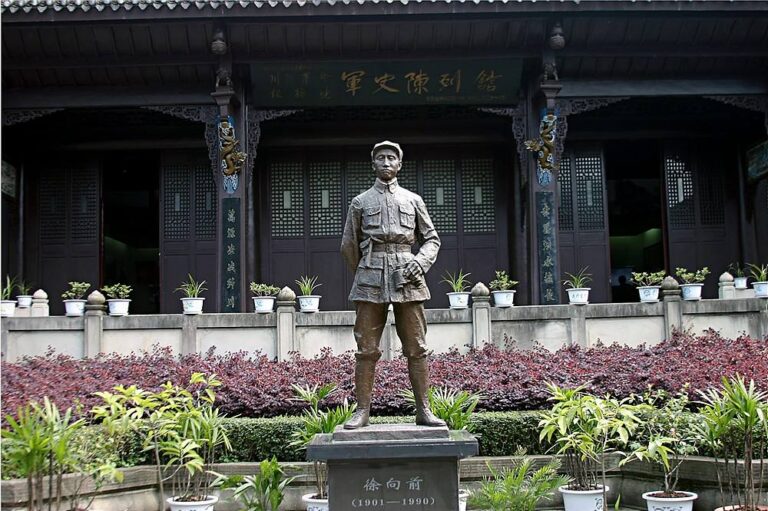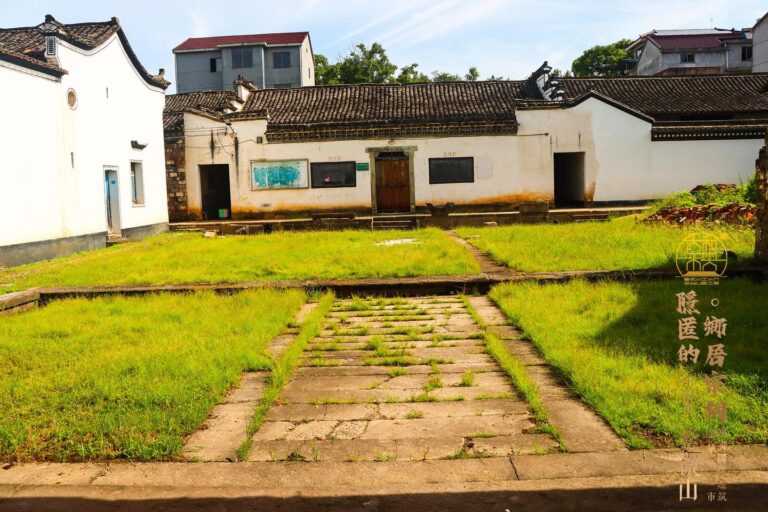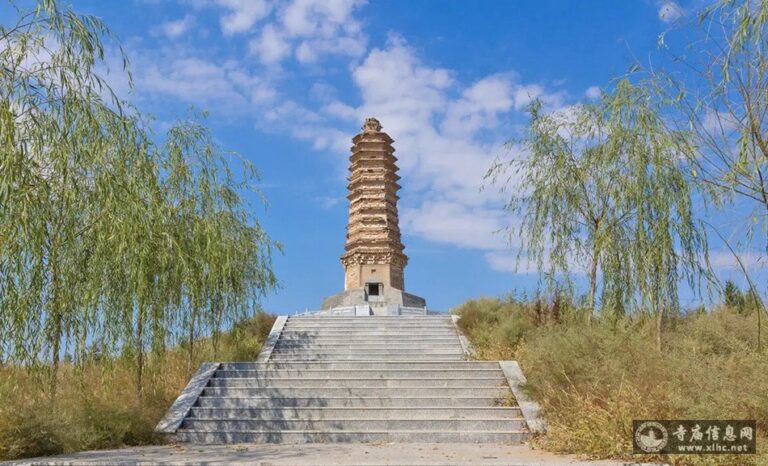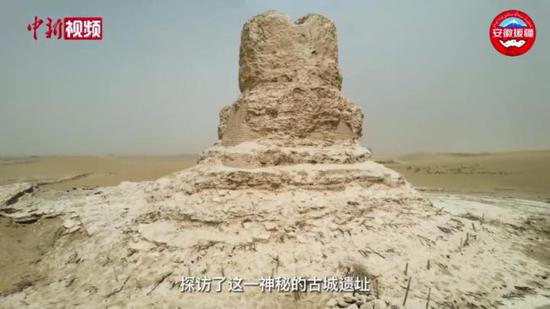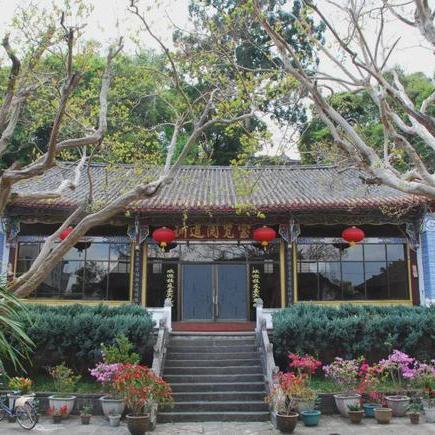Exploring the Mystique of Anyang Tangyinyuefeimiao: A Journey Through History
An Essential Guide to Visiting Anyang Tangyinyuefeimiao
In This Guide
- An Essential Guide to Visiting Anyang Tangyinyuefeimiao
- The Rich History of Anyang Tangyinyuefeimiao
- Main Highlights: What to See at Anyang Tangyinyuefeimiao
- Planning Your Visit: A Practical Guide
- Tickets, Hours, and Booking
- How to Get There
- Local Cuisine and Accommodation
- Frequently Asked Questions
- Final Thoughts on Your Trip
Nestled in the heart of Tangyin County, Henan Province, the Anyang Tangyinyuefeimiao, or the Yue Fei Temple, is a profound homage to one of China’s most revered national heroes. Originally known as Jingzhong Temple, this remarkable site was established to honor Yue Fei, a legendary general from the Southern Song Dynasty, celebrated for his valiant resistance against foreign invasions and his unwavering loyalty to his homeland.
The temple, with its majestic architecture and rich historical significance, serves not only as a memorial but also as a vibrant cultural hub. Visitors can explore six distinct courtyards filled with intricate stone inscriptions, vivid sculptures, and solemn shrines that narrate the life and legacy of Yue Fei. Among the most striking features is the central hall, which houses a grand statue of Yue Fei, exuding an air of nobility and righteousness, beneath a gilded plaque that proclaims his fervent plea: “Return My Rivers and Mountains.”
The surroundings are equally compelling, boasting the impressive stone figures of Yue Fei’s adversaries, symbolizing the eternal struggle between loyalty and treachery. As you wander through the temple grounds, you’ll encounter a collage of poetry and prose from various dynasties, all paying tribute to Yue Fei’s undying spirit.
Whether you’re a history enthusiast, a cultural explorer, or simply seeking a serene place to reflect, the Anyang Tangyinyuefeimiao invites you to step into a living narrative of valor and patriotism, making it an essential stop on your journey through China’s rich tapestry of heritage.
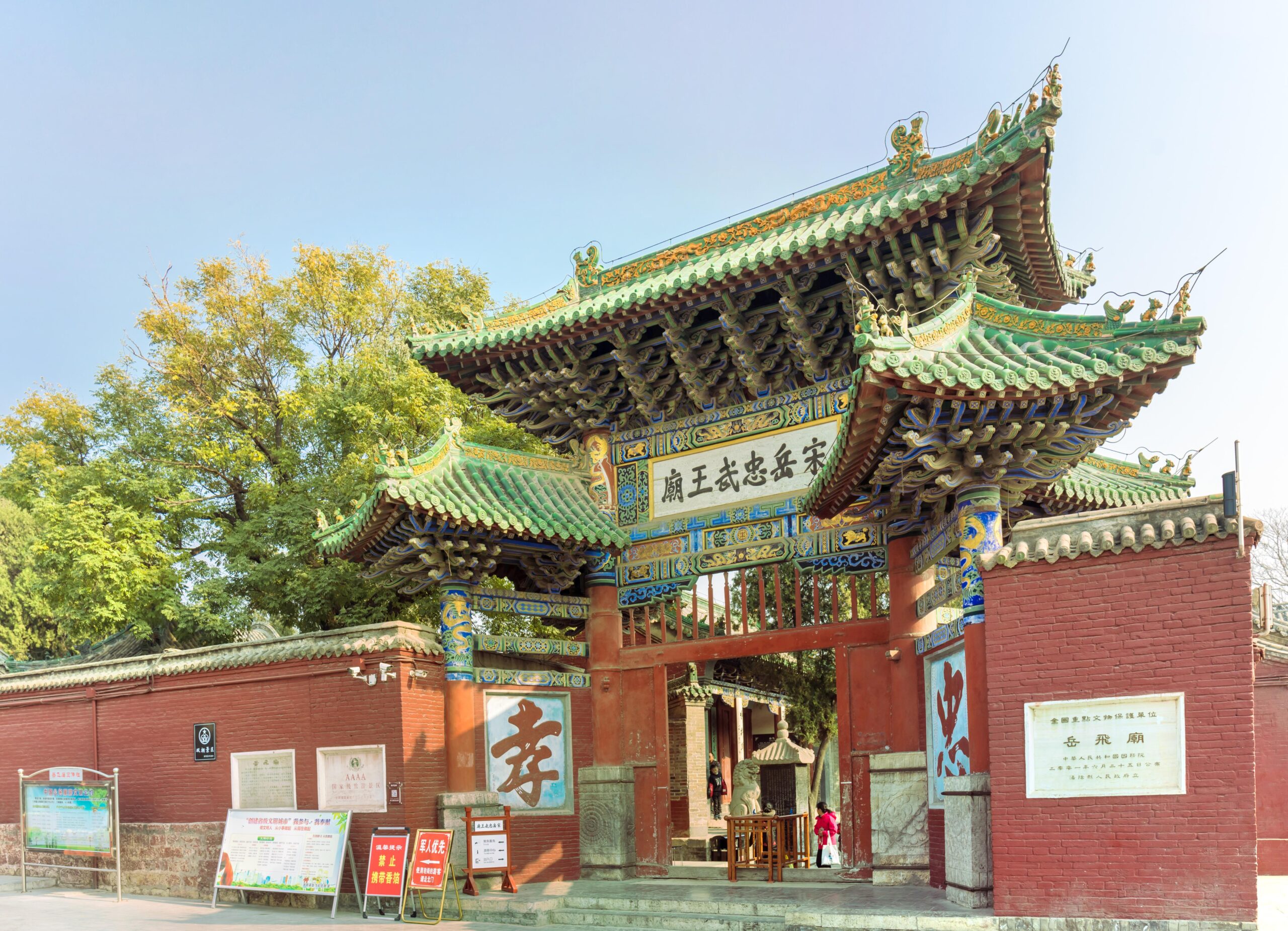
Anyang Tangyinyuefeimiao.
The Rich History of Anyang Tangyinyuefeimiao
Nestled in the heart of Anyang, Henan Province, the Tangyin Yue Fei Temple, originally known as the Jingzhong Temple, is a revered site dedicated to the legendary Southern Song dynasty general Yue Fei. This memorial complex stands as a testament to Yue Fei’s unwavering patriotism and heroism in the face of adversity during the Jin invasions of China.
Constructed in 1450 during the Ming Dynasty, the temple was built to honor Yue Fei, who is celebrated as a national hero for his relentless fight against foreign invaders. His life, however, was marked by tragedy; in 1142, he was wrongfully executed on charges of treason. The temple thus serves not only as a shrine to Yue Fei but also as a reminder of the injustices he faced and the loyalty he embodied. The temple’s architectural grandeur reflects the significance of Yue Fei in Chinese history, showcasing intricate designs and numerous inscriptions that highlight his valor.
The complex is arranged in a traditional layout comprising several courtyards, including the imposing Jingzhong Archway, which greets visitors with its elegant wooden structure and prominent calligraphy. The main hall, where a towering statue of Yue Fei resides, is adorned with inscriptions that echo his famous battle cries and his enduring commitment to reclaiming China’s lost territories. Among these inscriptions, the phrase “Return My Rivers and Mountains” stands out, encapsulating Yue Fei’s lifelong mission.
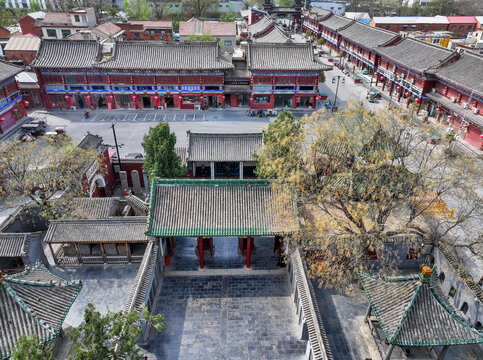
Anyang Tangyinyuefeimiao.
Surrounding the main hall, visitors will find various smaller shrines dedicated to Yue Fei’s family, including his mother, who famously tattooed the words “Serve the Country with Loyalty” on his back as a symbol of her hopes for his future. The temple complex also features statues of historical figures, including those of traitorous officials who conspired against Yue Fei, providing a stark contrast to the valor celebrated within the temple.
Over the centuries, the temple has undergone numerous renovations and expansions, reflecting its enduring importance in Chinese culture. Today, it is recognized as a national key cultural relic protection unit and a AAAA-rated scenic area, drawing thousands of visitors each year who come to pay homage to Yue Fei’s legacy.
The Tangyin Yue Fei Temple not only serves as a historical site but also as a place of inspiration for those who visit, reminding us of the values of loyalty, justice, and patriotism that resonate in contemporary society. As you walk through its storied halls and gardens, you can sense the deep reverence held for one of China’s most cherished heroes, making it a must-visit for anyone interested in the rich tapestry of Chinese history.
Main Highlights: What to See at Anyang Tangyinyuefeimiao
Nestled in the heart of Anyang, the Anyang Tangyinyuefeimiao (汤阴岳飞庙), also known as the 岳忠武王庙 (Temple of General Yue), is a striking monument dedicated to one of China’s most revered historical figures, General Yue Fei. This temple not only serves as a testament to Yue Fei’s legacy but also stands as a captivating example of ancient Chinese architecture and cultural heritage.
Architectural Marvel
The temple complex, originally built in 1450 during the Ming Dynasty, boasts an impressive layout featuring six courtyards filled with intricately designed halls and pavilions. The main entrance, known as 精忠坊 (Jingzhong Archway), is a beautifully constructed wooden structure that welcomes visitors with its ornate details and inscriptions that embody the values of loyalty and filial piety. As you pass through the archway, you are greeted by grand halls and an array of historical stone tablets that celebrate Yue Fei’s contributions and virtues.
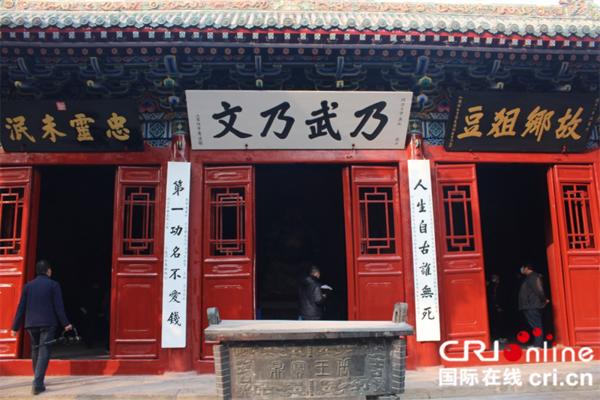
Anyang Tangyinyuefeimiao.
A Journey Through History
Visitors can explore the numerous shrines within the complex, including the main hall where a majestic statue of Yue Fei stands, exuding an aura of strength and righteousness. This central statue is accompanied by five large plaques inscribed with phrases that reflect his unwavering loyalty and dedication to his country. Among these, the phrase “还我河山” (Return My Rivers and Mountains) resonates deeply, reminding all of Yue Fei’s lifelong quest for justice and his commitment to reclaiming lost territories.
Cultural Significance
The temple serves as a crucial site for understanding Yue Fei’s life and his role in Chinese history. It features various halls dedicated to his family members, highlighting the importance of familial bonds and moral integrity. The inscriptions and poems throughout the temple, many authored by famous scholars and poets, further enrich the visitor’s experience, offering insights into the societal values of loyalty and patriotism that Yue Fei embodied.
Iconic Statues and Memorials
One of the most moving sites within the temple complex is the施全祠 (Shi Quan Shrine), which honors Shi Quan, a loyal general who sought revenge against Yue Fei’s betrayers. Here, visitors encounter the iron statues of the infamous Qian Kai and his accomplices, forever kneeling in shame, symbolizing the moral lessons against treachery and betrayal.
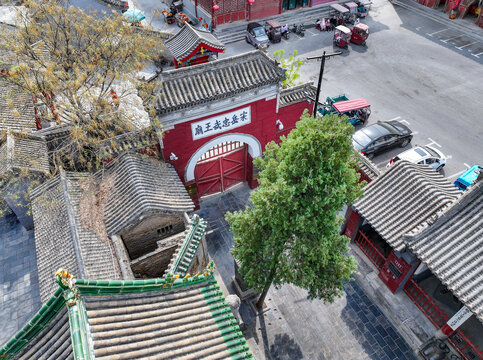
Anyang Tangyinyuefeimiao.
Visiting Tips
- Opening Hours: The temple is open daily from 8:00 AM to 5:30 PM, allowing ample time for exploration.
- Admission Fee: Entry to the temple is approximately 50 RMB, with discounts available for students and seniors.
- Location: Conveniently situated at 86 Yue Miao Street, Tangyin County, it is easily accessible by local transportation.
Conclusion
A visit to the Anyang Tangyinyuefeimiao is not just a journey into the past; it is an immersive experience that educates and inspires. As you walk through its hallowed halls, you will gain a profound understanding of the values that shaped Chinese culture and history, making this temple a must-visit for anyone keen on exploring the depths of China’s rich heritage.
Planning Your Visit: A Practical Guide
Practical Guide to Anyang Tangyinyuefeimiao (岳飞庙)
Visiting the Anyang Tangyinyuefeimiao, also known as the Yue Fei Temple, provides a unique opportunity to delve into the legacy of one of China’s greatest national heroes. Here’s everything you need to know for an enriching visit.
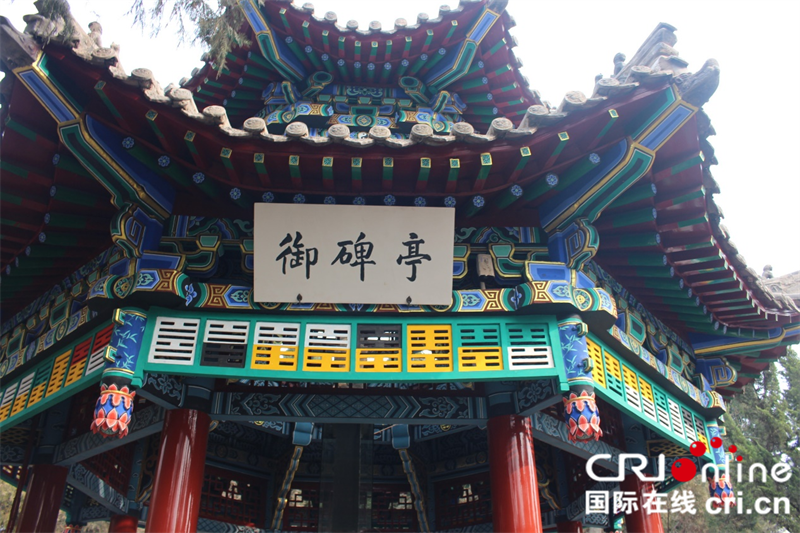
Anyang Tangyinyuefeimiao.
Location and Access
Address:
Yue Temple Street 86, Tangyin County, Anyang City, Henan Province, China.
The temple is located in Tangyin County, approximately 30 minutes south of Anyang city center. For those traveling from larger cities, you can reach Tangyin via high-speed train to Anyang, followed by a bus or taxi ride.
Getting There:
– Public Transport: Buses from Anyang East Station offer direct routes to Yue Temple Station. The fare is around 5 RMB.
– Driving: If you plan to drive, parking is available at the temple grounds.
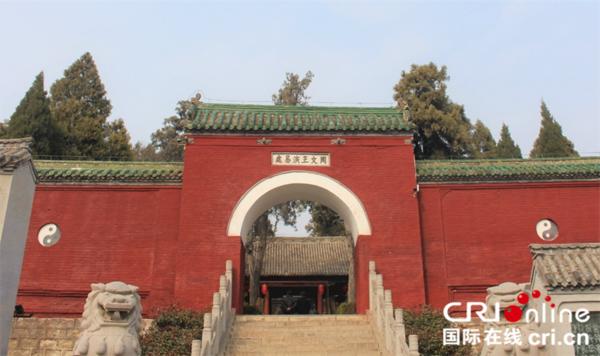
Anyang Tangyinyuefeimiao.
Opening Hours
- Peak Season (April to October): 07:30 AM – 06:00 PM
- Off-Peak Season (November to March): 08:00 AM – 05:30 PM
Admission Fees
- General Admission: 50 RMB (approximately $7 USD)
- Concessions: Half price for students and seniors over 60 with valid ID.
- Free for children under a certain height.
Duration of Visit
Plan to spend approximately 1 to 2 hours exploring the temple. This should allow enough time to appreciate the architecture, learn about Yue Fei’s life, and take photographs of the significant monuments.
Key Attractions within the Temple
-
Main Hall (正殿): This impressive structure houses a large statue of Yue Fei, clad in warrior attire and radiating strength. Look for the famous plaque inscribed with “Return My Rivers and Mountains,” reflecting Yue Fei’s enduring spirit.
-
Jingzhong Archway (精忠坊): The entrance to the temple, adorned with the characters “Loyalty” and “Filial Piety,” sets a powerful tone for your visit.
-
Sculptures of Traitors: At the Shiquan Shrine, you’ll find the kneeling statues of Qin Hui and his wife, symbolizing historical grievances against Yue Fei. This poignant exhibit draws a lot of attention and serves as a reminder of the injustices faced by the hero.
-
Memorial Tablets: The temple features numerous stone tablets commemorating the poetry and writings of historical figures, including Yue Fei’s own works.
-
Mother’s Hall (岳母刺字祠): Dedicated to Yue Fei’s mother, this area showcases the story of her having the words “Loyalty to the Country” tattooed on her son’s back, emphasizing the theme of patriotism.
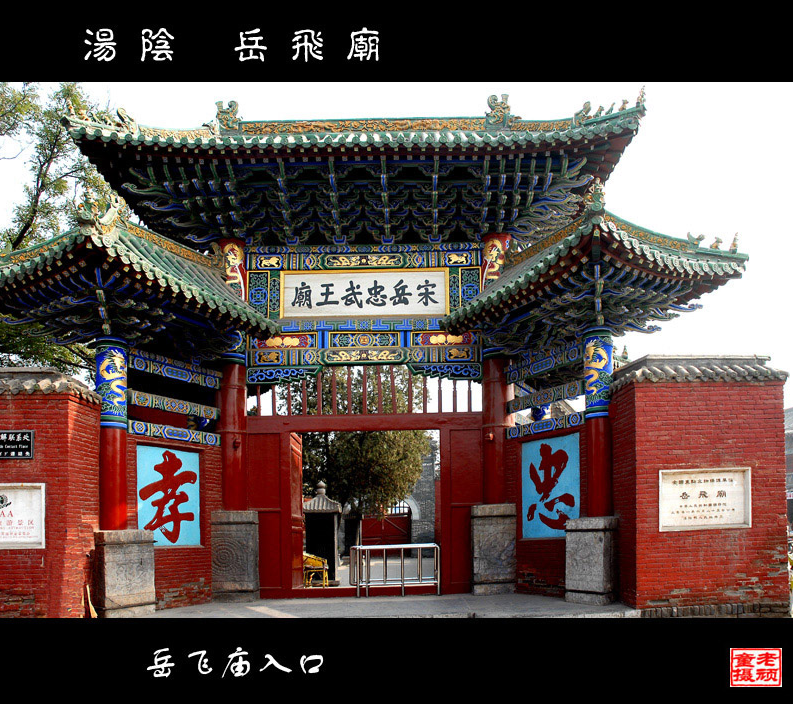
Anyang Tangyinyuefeimiao.
Tips for Visitors
- Photography: Capture the best angles by visiting during the golden hours of early morning or late afternoon. The low light enhances the beauty of the temple’s architecture.
- Respectful Attire: As this is a cultural and historical site, dress modestly and respectfully.
- Language: While some signage is in English, learning a few basic Mandarin phrases can enhance your experience.
- Food Options: Nearby eateries serve local cuisine. Try traditional Henan dishes for an authentic experience.
Nearby Attractions
- Yue Fei Historical Exhibition Hall: Just a short walk from the temple, this hall provides deeper insights into Yue Fei’s life and contributions.
- Anyang Ruins (殷墟): A UNESCO World Heritage site, these ancient ruins are about 30 minutes from the temple and offer a glimpse into China’s Shang dynasty.
Final Thoughts
Visiting the Anyang Tangyinyuefeimiao is not just a journey through history; it’s an invitation to reflect on ideals of loyalty, bravery, and patriotism that continue to resonate in modern China. Whether you are a history enthusiast or simply curious about Chinese culture, this temple promises an unforgettable experience.
Tickets, Hours, and Booking
When planning a visit to the Anyang Tangyinyuefeimiao (岳飞庙), also known as the Temple of Yue Fei, it’s important to be aware of the ticket prices and operating hours to make the most of your experience.
Ticket Prices:
– General Admission: 50 CNY (approximately 7 USD)
– Discounted Rates:
– Students: 25 CNY (approximately 3.50 USD)
– Seniors (60 years and older): 25 CNY (approximately 3.50 USD)
– Children under 1.2 meters in height: Free admission
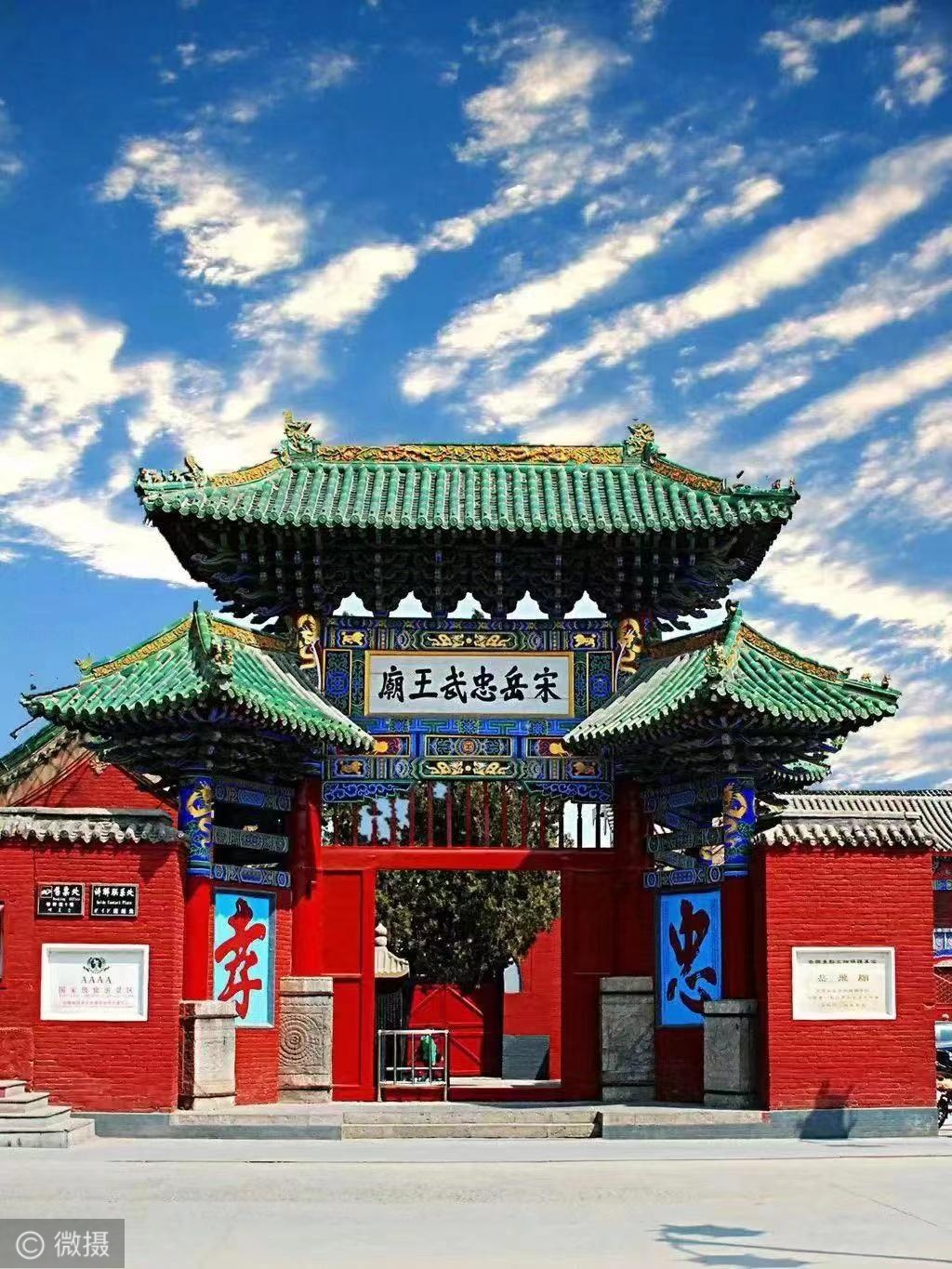
Anyang Tangyinyuefeimiao.
These ticket prices allow visitors to explore the rich history and cultural significance of the temple, which is dedicated to the revered Song Dynasty general Yue Fei, known for his patriotism and military prowess.
Operating Hours:
– Summer Season (April to October): 08:00 AM to 06:00 PM
– Winter Season (November to March): 08:00 AM to 05:30 PM
Visitors are encouraged to arrive early in the day to fully appreciate the site’s extensive grounds and significant structures, including the main hall and the various memorials dedicated to Yue Fei and his family.
Additional Tips:
– It’s advisable to check for any special events or exhibitions that may be taking place during your visit, as these can enhance the experience.
– Consider purchasing tickets in advance, especially during peak tourist seasons, to avoid long queues.
Immerse yourself in the fascinating history and architectural beauty of the Tangyinyuefeimiao, a landmark that stands as a testament to Chinese culture and heroism.
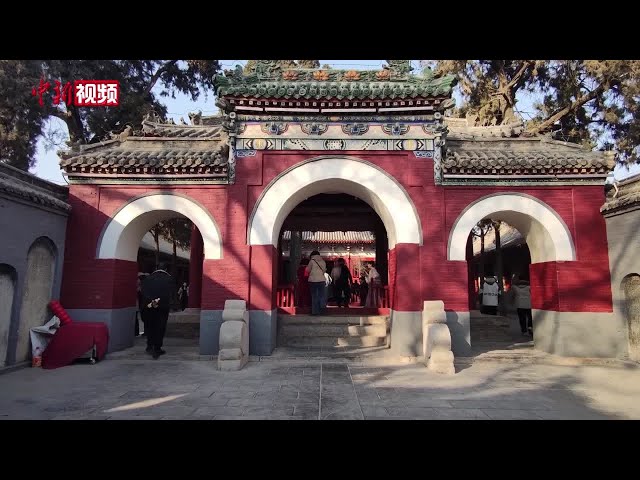
Anyang Tangyinyuefeimiao.
How to Get There
Visiting the Anyang Tangyinyuefeimiao (岳飞庙), also known as the Yue Fei Temple, offers a unique opportunity to immerse yourself in Chinese history. To ensure a smooth and enjoyable journey to this historical site, here are the transportation options available:
Getting There
By Air
The nearest major airport is Zhengzhou Xinzheng International Airport (CGO), which is approximately 140 kilometers away from the Yue Fei Temple. From the airport, you can take a taxi or arrange a shuttle service to Anyang City. The drive typically takes about 2 to 2.5 hours, depending on traffic conditions.
By Train
For those traveling by train, the Anyang Railway Station is well-connected to various cities in China, including Beijing, Shanghai, and Zhengzhou. Once you arrive at Anyang Railway Station, you can take a taxi or a local bus to the Yue Fei Temple. The taxi ride is about 20 minutes, while buses may take a bit longer, depending on the route.
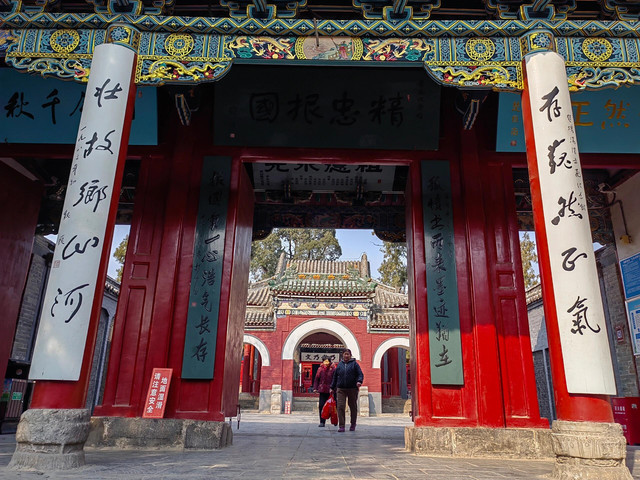
Anyang Tangyinyuefeimiao.
By Bus
Multiple bus services operate between major cities and Anyang. If you are coming from Zhengzhou, take a long-distance bus from the Zhengzhou Bus Station to Anyang. The journey usually lasts around 2-3 hours. Upon arriving at the Anyang Bus Station, you can catch a local bus or taxi directly to the Yue Fei Temple.
Local Transportation
Once in Anyang, the local transportation network is efficient and convenient:
– Public Buses: Bus routes 1 and 3 provide direct access to the Yue Fei Temple. The fare is inexpensive, typically around 1 to 2 RMB.
– Taxis: Taxis are readily available, and a ride from the city center to the temple will cost approximately 15 to 30 RMB, depending on traffic.
Driving
If you intend to drive, the Yue Fei Temple is accessible via the G107 national road. There is free parking available at the temple, which is convenient for self-driving travelers.
Tips for Travelers
- Plan Ahead: Consider traffic conditions, especially during peak hours, to avoid delays.
- Local Language: While many signs are in both Chinese and English, having a translation app or basic Chinese phrases can greatly enhance communication with taxi drivers and locals.
- Timing Your Visit: The temple is open from 8:00 AM to 5:30 PM, so plan your journey accordingly to make the most of your visit.
With these transportation options and tips, reaching the Anyang Tangyinyuefeimiao will be a hassle-free experience, allowing you to focus on exploring the rich history and culture that the temple embodies.
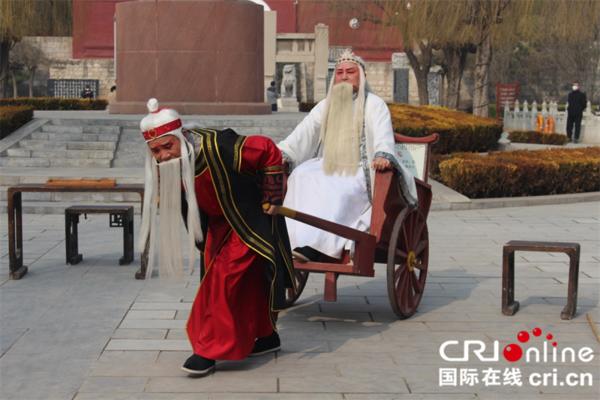
Anyang Tangyinyuefeimiao.
Local Cuisine and Accommodation
When visiting the Anyang Tangyinyuefeimiao (岳飞庙), a site steeped in history and cultural significance, you’ll want to indulge in the local culinary delights and find comfortable accommodations nearby.
Dining Options
-
Shengdeli (盛德利)
Located just under 22 kilometers from the temple, Shengdeli offers a taste of authentic Henan cuisine. With a rating of 4.7, this restaurant is known for its hearty dishes that reflect the region’s culinary traditions. Expect to pay around ¥63 per person. -
Tonglaishun (同来顺)
A highly rated spot on Jiefang Road, Tonglaishun serves up delightful local fare at reasonable prices, around ¥45 per person. Their menu includes a variety of Henan specialties, making it a great choice for those wanting to dive deeper into the local flavors. -
Jiafeng Laoguanzi (家风老馆子)
This restaurant shines with a perfect 5.0 rating and is about 18 kilometers from the temple. It boasts a warm atmosphere and serves traditional dishes that are a must-try for any visitor. Expect a similar price point of around ¥63 per person. -
Old City Root Fusion Family Feast (老城根融合家宴)
A bit closer at just 515 meters from the temple, this dining spot offers a unique blend of local flavors in a family-friendly setting. While specific prices may vary, it’s an excellent option for those looking to stay close to the temple.
Accommodation
-
Vienna International Hotel (维也纳国际酒店)
Situated near the bustling Shangyi Square, this hotel boasts a high rating of 4.8 and offers comfortable rooms starting from approximately ¥256. The location makes it easy to access the temple and other local attractions. -
Jinjiang Inn (锦江之星品尚酒店)
A reliable chain known for its quality and affordability, the Jinjiang Inn near Shangyi Square has an impressive rating of 4.6. Rooms start at around ¥168, making it a budget-friendly option. -
Lanou Hotel (兰欧酒店)
Close to the temple, this hotel offers a cozy atmosphere with a rating of 4.7. Rates begin at approximately ¥143, ideal for travelers seeking comfort without breaking the bank. -
Green Tree Inn (格林豪泰)
This hotel is another excellent choice, rated 4.7, with room rates starting at ¥162. It’s conveniently located for easy access to both the temple and local dining options.
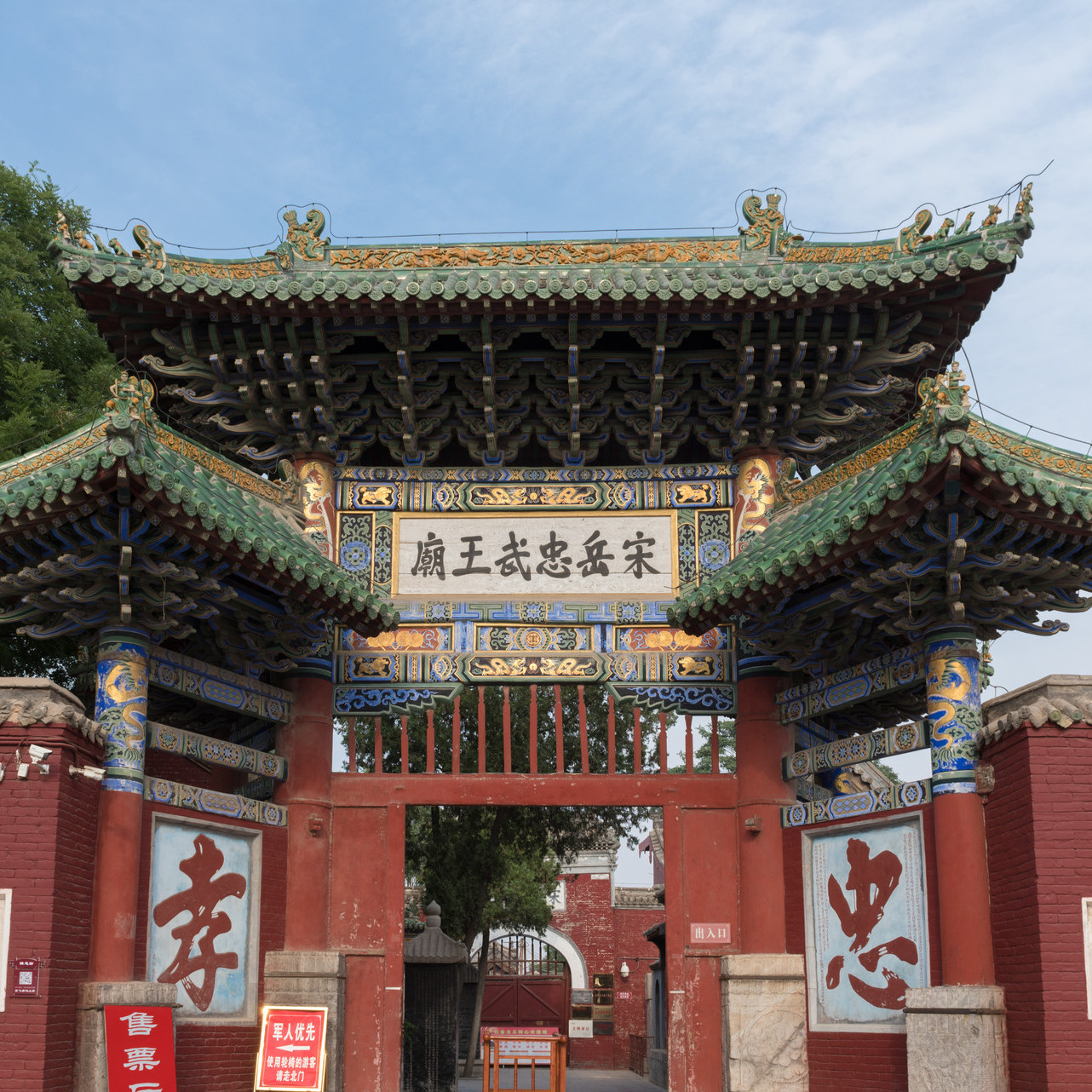
Anyang Tangyinyuefeimiao.
Final Tips
While exploring the historical grandeur of Tangyinyuefeimiao, take the time to savor the local cuisine, which is an integral part of the experience. With various dining and accommodation choices available, you can easily find a place that fits your taste and budget, allowing you to make the most of your visit to this significant cultural site.
Frequently Asked Questions
-
What are the opening hours of Anyang Tangyinyuefeimiao?
The temple is open daily from 8:00 AM to 5:30 PM, with extended hours during peak seasons (April to October). -
How much is the entrance fee?
Admission to Anyang Tangyinyuefeimiao is approximately 50 CNY (around 7 USD) for adults. Discounts are available for students and seniors over 60. -
Where is Anyang Tangyinyuefeimiao located?
The temple is situated at 86 Yue Temple Street, Tangyin County, Anyang City, Henan Province, China. -
How long should I plan to spend visiting the temple?
Visitors typically spend about 1 to 2 hours exploring the site, which includes various halls, memorials, and historical artifacts. -
Are there guided tours available?
Yes, guided tours are often available at the temple, providing in-depth historical context and insights into the significance of the site. -
What is the best way to get to Anyang Tangyinyuefeimiao?
You can reach the temple via public transportation, including buses that run from Anyang city center. Alternatively, taxis and personal vehicles are also convenient options. -
What nearby attractions should I visit?
Nearby attractions include the Yue Fei Historical Exhibition Hall, the Anyang Yin Ruins, and the Zhouyi Cultural Heritage Park, all of which enrich your understanding of the region’s history. -
Is there any food or shopping available near the temple?
Yes, there are several local restaurants and shops in the vicinity where visitors can sample traditional Henan cuisine and purchase souvenirs related to the temple and local culture.
Final Thoughts on Your Trip
Visiting the Anyang Tangyinyuefeimiao is more than just a stroll through a historical site; it is a profound journey into the heart of Chinese culture and patriotism. Nestled in the picturesque landscape of Henan Province, this temple stands as a testament to the enduring legacy of Yue Fei, a revered figure in Chinese history known for his unwavering loyalty and valor.
As you walk through the majestic halls and gaze upon the intricate sculptures and ancient inscriptions, you will feel the echo of history resonate within you. The stories of sacrifice, honor, and the struggle for justice come alive, offering a unique insight into the spirit of resilience that defines the Chinese people.
Whether you are a history enthusiast, a cultural explorer, or simply seeking inspiration, the Tangyinyuefeimiao provides a reflective space to contemplate the values of loyalty and bravery. It invites visitors to connect not only with the past but also with the ideals that continue to inspire generations.
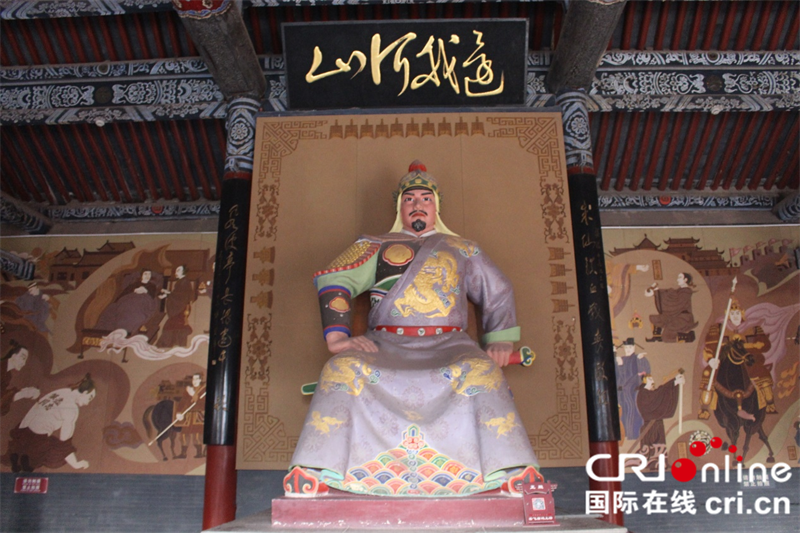
Anyang Tangyinyuefeimiao.
In conclusion, this sacred site is a must-visit, promising a rich and rewarding experience that transcends time. Allow yourself to be moved by the stories it tells, and carry a piece of Yue Fei’s indomitable spirit with you as you depart. Experience the beauty and significance of the Anyang Tangyinyuefeimiao, and let it inspire your own journey.
